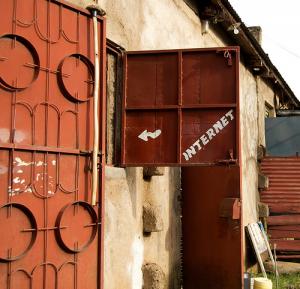By Joy Liddicoat, Project Coordinator, Internet Rights are Human Rights, Association For Progressive Communications (APC).
(Editor's note: This is the first of several contributions to GVA by civil society participants at this week's Internet Governance Forum in Nairobi, Kenya. For more information about how to follow and participate in the IGF remotely, click here.)
On the eve of the Internet Governance Forum almost a hundred people gathered to focus on access, rights, development and empowerment. Despite the diversity of voices from the global south, the similarity of issues was startling.
 Eva Kaloki from the Kenyan Human Rights Commission emphasised equitable access for those in rural areas. She also emphasized the power of technology in the hands of people, as evidenced by the birth of Ushahidi, an open source platform used to crowdsource information on the post-election violence following Kenya’s 2007 elections.
Eva Kaloki from the Kenyan Human Rights Commission emphasised equitable access for those in rural areas. She also emphasized the power of technology in the hands of people, as evidenced by the birth of Ushahidi, an open source platform used to crowdsource information on the post-election violence following Kenya’s 2007 elections.
Bidi Bala from Fantsuam in Nigeria highlighted that while access issues remained, especially in rural areas, mobile GSM was enabling more access than telecentres. With access comes demand for political participation and signs are emerging of the use of ICTs to document human rights violations, in some cases leading to arrests of perpetrators.
In Pakistan, Shahzad Ahmad of Bytes for All referred to last week’s three-hour shutdown of FaceBook, YouTube and various civil society website. Government blocking of websites is becoming pervasive.
From India, Anja Kovacs reported that most people (especially the poor) use cyber cafes, but recent laws are threatening their access by requiring retention of user information for 12 months, official identification, a photograph on entry, that cubicles to be no higher than 4½ feet, and prohibiting minors from unsupervised internet use.
Graciela Selaimen from Instituto NUPEF in Brazil noted that Brazilian internet users in the Amazon pay five times more to connect to the internet than users in Paris.
Steve Song of Village Telco summarised the emerging issues of access, development and rights as falling into two broad categories: getting access and maintaining access. Participants from the private sector, government and civil society called for a rights-based approach to internet governance.
Against this backdrop, it is clear that governments are positioning themselves around internet governance issues and their role in multi-stakeholder processes (as seen by the recent statement by India, Brazil and South Africa). But the politics associated with this must not detract from the issues that are facing civil society in developing countries, nor be a smokescreen behind which governments, or others, can hide their increasingly sophisticated interference with human rights and the internet.
If we take our eyes off the rights violations now, it will be too late to try and claw them back. Above all, the risk is that the people of Kenya, cybercafé users in India and CSOs from around the world, will be further marginalised.
That’s why APC is calling for the main theme of the IGF in 2012 to be human rights.
Follow Joy's tweets from the IGF all week at @internetrights. For tweets by all attendees follow the #IGF11 hashtag on Twitter.
(Image courtesy APC.org)




3 comments
far east plaza chinatown…
[…]then in May, something happened[…]…